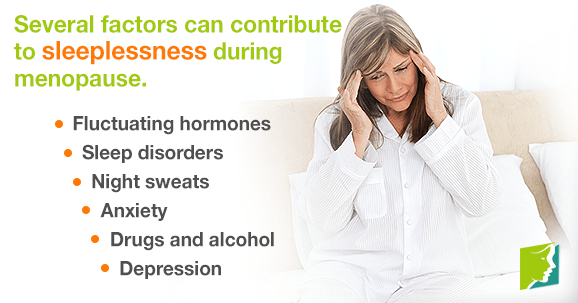Many women find that they have trouble sleeping while they are going through menopause. In fact, sleeplessness is the second most commonly reported menopause symptom after hot flashes. The exact cause for sleeplessness is hard to pinpoint due to the fact that there are many menopause symptoms and other unrelated factors that can cause it.
Making lifestyle changes and treating any underlying conditions you may have that can cause sleeplessness can help.
What Is Causing My Sleeplessness?
Several factors can contribute to sleeplessness during the menopause transition.
Fluctuating hormone levels
Although this is generally cited as a cause for everything that can go wrong during menopause, your changing hormones can actually change your circadian rhythms; they govern when your body is at rest and when it is fully awake. Hormonal imbalance is considered the most common cause.
Sleep disorders
There are dozens of sleep disorders that people can develop. Insomnia and sleep apnea, for example, can both be related to changing levels of estrogen. It's important to see a doctor who will be able to diagnose a sleep disorder and give you any treatment that can help.
Night sweats
Because common nighttime habits (e.g., eating spicy food for dinner or drinking at night) can trigger night sweats, it's important to make lifestyle choices that allow you to get a good night's sleep. Although night sweats are often blamed for causing all of a woman's sleep problems, they are not the only thing that can cause sleeplessness.
Anxiety
This psychological response to stress can greatly affect your quality of life during menopause, as well as the quality of your sleep. Anxiety causes a person to feel powerless, chronically nervous, and feel like something horrible will happen in the near future.
Drugs and alcohol
Caffeine and nicotine are known stimulants that can rob you of your sleep. However, contrary to popular belief, alcohol can also disrupt your sleep patterns. Drinking large quantities of alcohol can cause you to pass out. However, this is not the type of sleep you want and can result in feeling not well rested the next day.
Depression
Approximately one in ten women in the United States report feeling depressed during menopause. Symptoms of depression include feeling constantly sad and hopeless. This clinical condition can cause a person to have trouble falling asleep or staying asleep.
More Information about Sleeplessness during Menopause
If you feel like you have an underlying condition causing your sleeplessness, it is important to seek treatment to treat that condition. If your inability to sleep is altering your quality of life, it is also important to see a doctor. Lifestyle changes and natural remedies are usually the first recourse to treat sleeplessness. Sleeping pills have come under fire for being addictive and not causing people to get the right type of sleep. However, sleeping pills can be helpful in the short term. Click on the following link to read more about treating sleep disorders.
Sources
- Australian Menopause Society. (2014). Sleep Disturbance and the Menopause. Retrieved October 7, 2015, from https://www.menopause.org.au/for-women/information-sheets/32-sleep-disturbance-and-the-menopause
- Hollander, L.E. et al. (2001). Sleep quality, estradiol levels, and behavioral factors in late reproductive age women. Obstetrics and Gynecology, 98(3), 391-397. Retrieved from http://www.ncbi.nlm.nih.gov/pubmed/11530118
- Netzer, N.C. et al. (2003). Women with sleep apnea have lower levels of sex hormones. Sleep & Breathing, 7(1), 25-29. Retrieved from http://www.ncbi.nlm.nih.gov/pubmed/12712394




